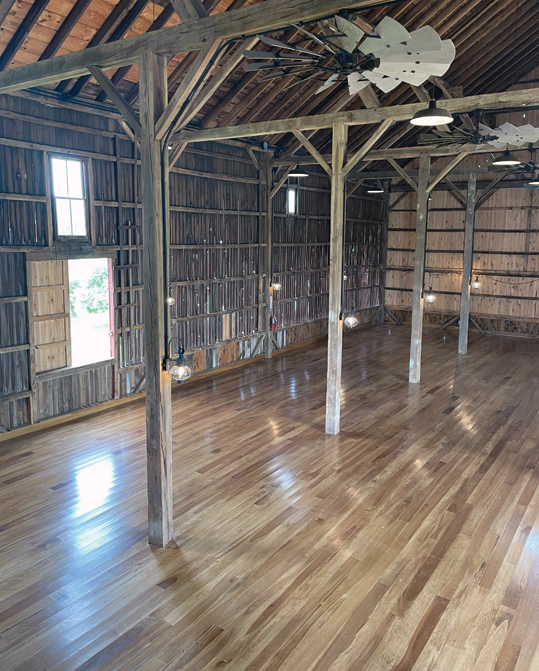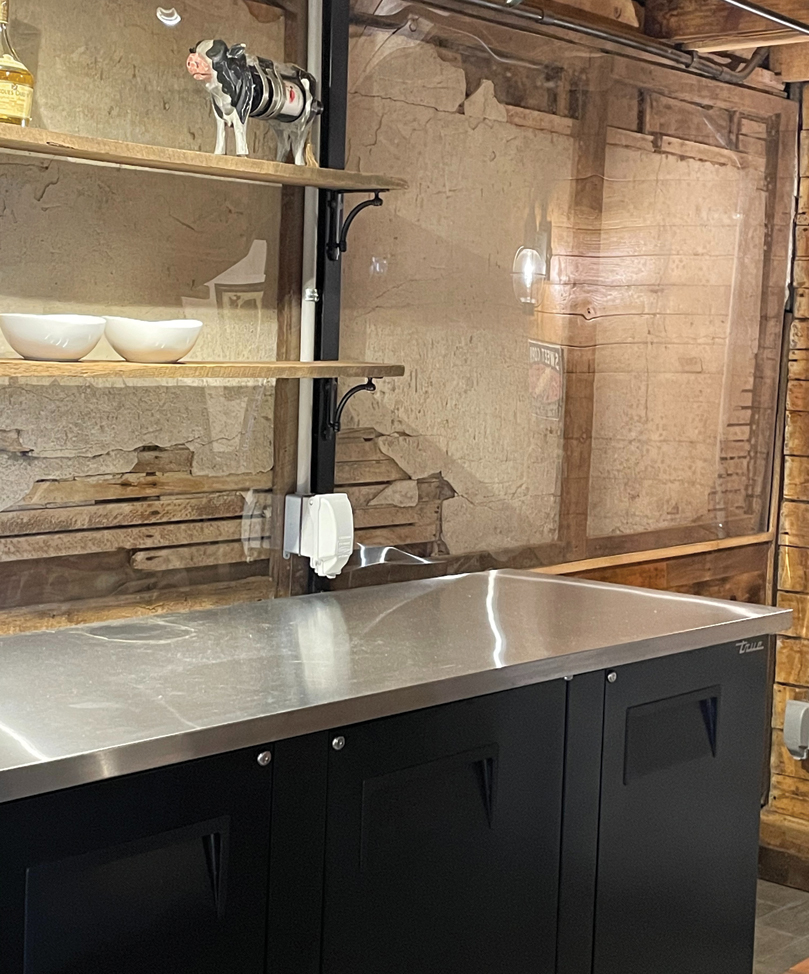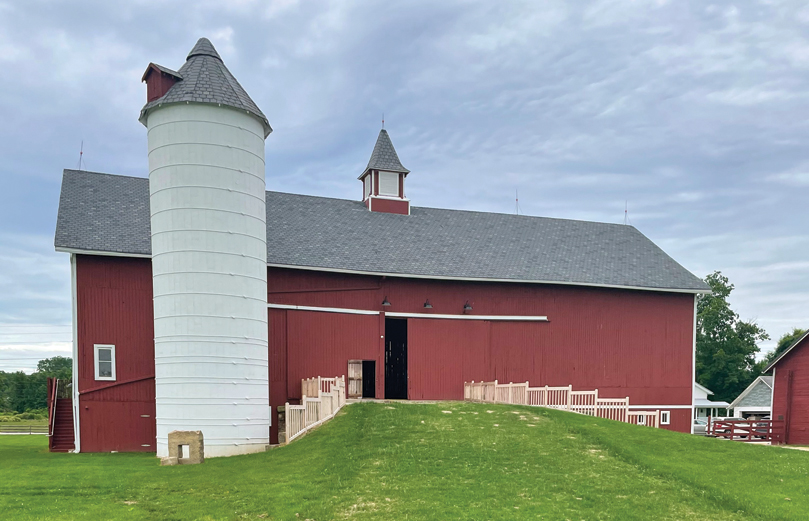Big Red is open for business
Case-Barlow Farm ready to show off its newly opened event center
by Judy Stringer
Imagine, said longtime resident Linda Matty, driving down the eastern portion of Barlow Road and not seeing the iconic “Big Red” barn.
That was nearly the case. When the Barlow Family donated its 65-acre, 19th century homestead to First Congregational Church of Hudson in 1995, housing developers were chomping at the bit. Matty was among a group of Hudsonites who moved quickly to preserve the historic dairy farm.
In 1996, they created the nonprofit Case-Barlow Farm Inc. and signed a $165,000 land contract with First Congregational to purchase 4.2 acres of the property containing the 1890 “Big Red” bank barn in addition to an 1830 farmhouse, milk house, corn crib, wagon shed and outhouse.
25 years later, Matty and her team are ready for the community to get as familiar with the now renovated inside of Big Red as they are with the outside.
“I guess you could say we are open for business,” she said. “It’s come along so beautifully that we really are happy to promote it and have everyone come and see the work that has been done here.”

The barn’s reopening has been a painstakingly arduous process, according to Matty, who is president of Case-Barlow Farm Inc. She is part of a 13-person trustee board that oversees the property. Other trustees include Secretary Julie Linder and Treasurer Leah Roth.
The all-volunteer nonprofit spent the first decade or so bringing the farmhouse up to code – adding water and sewer lines, etc. – and doing some modest renovations so it could host tours of the home and grounds and give visitors a glimpse into how some of Hudson’s earliest settlers lived.
Since then, the Case-Barlow board has turned its focus to a central piece of the farm’s long-term sustainability – converting the three-story Big Red barn into a cash-producing event space. That started with buttressing the foundation and installing plumbing and electrical systems in the lower level.
“We were working for years underneath, but if you were to drive by you would never notice anything going on,” Linder said. Costly structural repairs, like fixing the collapsing western wall and replacing the roof had to follow, she added, “before we could get to the fun stuff,” referring to the newly opened event space.
Today, the barn’s main level, formerly used for hay and farm equipment storage, hosts a sprawling dance floor and dining area, a kitchenette, three restrooms and a cozy loft.
Matty said local designer Gay Grell helped conceptualize the space’s layout and much of the finishing touches. A stairwell that used to come up in the middle of the main level, for example, was closed to optimize the floor space. A storage area under the loft was converted into the kitchenette and restrooms.

When possible, renovations were completed to reflect the barn’s time period and preserve its rustic feel. The group used tulip poplar flooring in the main event area because it was a common hardwood in homes during that era. They replaced deteriorated siding with new siding and constructed a bar using reclaimed wood from barns of similar vintage.
Matty said wrought iron lighting fixtures and fans above the dance/dining floor, wood-look porcelain tiles in the bathroom area and stainless steel countertops in the kitchenette bring functionality without making the space seem “too fancy.”
“The end result is not a showplace but an authentic place,” she said. “It’s kind of a rustic-glam mix.”
Of course, efforts were made to let the barn tell a bit of its own story. They preserved the original ladder to the loft, encased walls in the kitchenette showcasing horsehair plaster, and have a display area in the back of the event space for artifacts from the dairy farm.
“It’s our mission to connect people with history, so having those educational opportunities wherever possible was important as we moved forward with the renovations,” Linder said.
Rooted in history
The Case-Barlow Farm, founded by Chauncey and Cleopatra Case in 1814, stayed in the family through five generations. The Cases initially lived in a cabin across the street while building their farmhouse. They made their own bricks, Matty said, and the home was one of the first brick houses west of Pittsburgh.
According to the Case-Barlow Farm’s website, Chauncey passed the farm – about 418 acres at the time – to his son Henry. Henry passed it to his daughter Hattie, the wife of Franklin Barlow. Franklin and Hattie transferred ownership to their son Henry Case Barlow, who later conveyed the property to his son Donald.
Over the years, most of the farm’s 418 acres was sold off. It was Donald who donated the remaining land and its buildings to First Congregational. At about the same time Case-Barlow Farm Inc. purchased its four acres from the church, the city bought the surrounding 60 acres, which it operates as Barlow Farm Park.
Beyond the longevity of its family ownership, the farm has some interesting historical ties. Lora Case, a well-known Underground Railroad activist and childhood friend of John Brown, grew up on the farm. It is also believed that Lora’s parents, Chauncey and Cleopatra, hid black fugitives in the wooded lot at the edge of the farm and were likely Abolitionists.
Reinvestment
Linder said future projects include restoring the barn’s lower level and using that as an educational space for tours and community open houses. The board also plans to enhance a grassy parking area behind the barn by adding a sub-base grid. Part of a recent $75,000 grant from the state of Ohio, Roth said, will help fund grid installation and reseeding.
“We’re fortunate that we have no debt,” Roth added. “We’ve raised the funds and paid for things along the way and gotten a lot of grants and help from local companies and businesspeople.”
For now, the board and its volunteer force are focused on getting the word out about the new event space. The site, so far, has hosted a baby shower, baby christening and Hudson High School’s After Prom celebration. Upcoming engagements include a wedding and a fall corporate event.
“Our goal is not to become a big party center with multiple employees or anything like that,” Matty said. “It’s just to provide a stream of income coming in that we can all put straight back into this property.”
In addition to private gatherings, the barn will also be used for community events, such as Case-Barlow’s monthly summer open houses and fall fest. The next open house takes place Sunday, July 11. The 2021 Barlow Farm Fall Fest is on Sunday, Sept.19.
For up-to-date information about the Wednesday farm stands and summer open houses, visit facebook.com/casebarlowfarm. For more information about the farm, its history and events, visit casebarlow.com. ∞

